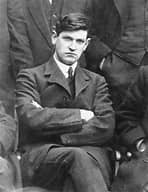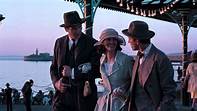IRISH HISTORY: a dance in the reel of the flickering light
IRISH HISTORY:
a dance in the reel of the flickering light
by Norman Warwick
There is no logical reason that I can think of for my mind always associating the film Michael Collins with the Christy Moore recording of Dance In The Reel Of The Flickering Light, other than my response to those clues in any one-word association game would be ´Irish.´ So firmly fixed is that association, however, that I take pleasure in applying it in our headline.
I was reminded of the film Michael Collins once again recently when reading a piece by Clara Moloney, published in Paste on-line magazine in October 2021.

¨In Ireland´, Clara reminded us, ´The film biography of Michael Collins (left) remains a cornerstone of both pop culture and popular history: We’ve all seen it, probably lots of times, so it’s a big part of how we understand our nation and its history. For me, and I’m sure millions more, when I picture some of the most significant figures in Irish history they look like Liam Neeson or Alan Rickman.
Michael Collins begins with the Easter 1916 uprising before following Collins (Liam Neeson)—Michael, Mick, the big fellow—through the Irish War of Independence, where he leads the Irish Republican Army in a guerrilla war against the British state. Mick is charismatic, funny and endlessly passionate about Ireland’s freedom. Neeson is electric, playing Mick as a clear-eyed strategist even as he lets us glimpse the toll it takes on his soul to send young Irish men—boys, really—out with rifles in their hands.
The Anglo-Irish Treaty, which falls short of creating an Irish Republic, brings the War of Independence to an end but leads to the Civil War between those who support and oppose the treaty. Mick is pro-treaty, opposite to many of the men he’s been fighting alongside. There’s president Éamon de Valera (Alan Rickman), who frequently clashed with Mick on matters as substantial as military tactics and as ephemeral as personality, and there’s Harry Boland (Aidan Quinn), Mick’s dearest, dearest friend. It seems like the only person who he hasn’t lost is Kitty Kiernan (Julia Roberts), a sweet girl both he and Harry were in love with.
There’d been idle consideration of making a film about Michael Collins for a while—at one point, Michael Cimino (The Deer Hunter) was going to direct Gabriel Byrne in the role; at another, Kevin Costner was interested—but Jordan must have pitched the hell out of it, because Michael Collins is a big film, full of movie stars, with the kind of Hollywood sheen that comes with Hollywood budgets. It’s 1996, and you’ve got Liam Neeson, Julia Roberts, Aidan Quinn (shown on our cover picture) and Alan Rickman as the leads. I imagine that Jordan convinced Warner Bros. it might even make them some money.
In most of the world, it flopped. It got some minor Oscar nominations—score and cinematography—and even won the Golden Lion at the Venice Film Festival, but largely didn’t make much of a ripple, critically or commercially. But if to the rest of the world it’s a vaguely remembered, decidedly minor work, the opposite is true in Ireland.
Michael Collins was the highest-grossing film of all time in Ireland when it was released, grossing four million Irish pounds. Though it was rated R in the U.S. and 15 in Britain, it was released here with a PG certificate, with the Irish Film Censor stating, “because of the subject matter, parents should have the option of making their own decision as to whether their children should see the film or not.”

That historical importance of Michael Collins, the man, (right) is a big part of its popularity, of course: It’s a part of Irish history that we all know intimately, perhaps more so than any other piece of our history. But on top of that, at a time when Ireland’s film industry had hardly begun to develop—only three years after the re-establishment of the Irish Film Board—Michael Collins was the biggest film ever produced here. And unlike the legion of stage-Irish top-of-the-morning rubbish that had passed for Ireland in American films, Michael Collins wasn’t plastic or inauthentic. While I love, say, The Quiet Man—John Ford’s 1952 film starring John Wayne and Maureen O’Hara, made in Cong, Co. Mayo—I am keenly aware that it’s not “for” me. It’s for Americans and the false, romantic Ireland of their imaginations. Michael Collins doesn’t feel that way for a single second.

It’s remained a key fixture in Irish culture in the 25 years since. I’ve seen it dozens of times, minimum every Christmas for as long as I can remember. I’ve seen it re-released on the big screen for the centenary of the Easter Rising. I own a paperback copy of the screenplay for no particular reason. I was shown it in school many, many times. (My history textbook had a big yellow box saying that one of the film’s most notorious deviations from reality—it implies Éamon de Valera (left) was involved in Collins’ death—has no historical basis.) Stephen Rea-as-Ned Broy, writing in his notebook, is the definitive meme of Irish Twitter, the go-to response to any and all West Brit-ery.
And so Michael Collins ends up falling between two stools: Outside of Ireland, it’s too insignificant for much consideration; inside Ireland, it’s so significant that it becomes hard to think about as a movie, to separate out from everything that surrounds it. Talking about Michael Collins means talking about how we imagine our own history, quickly devolving into arguments about historical accuracy or the quality of non-Irish actors’ accents. (For the record, it’s become a bit of a truism that Julia Roberts does a bad Irish accent, but to my ear, she sounds so much like Sinéad O’Connor that the O’Connor songs included in the film feel like Kitty Kiernan (Roberts´ character), is singing them. It’s a shame, because it really is a great film, worth taking on its own terms´.
My education has always been acquired not from school curricula in childhood but from artists and narrators, reliable or unreliable, and as a born and bred Yorkshire man I would unashamedly admit that my first awareness of the history behind the Irish troubles of my generation was gained through music, fictive literature and film.

Clara Moloney describes the significance of the film quite perfectly. She seems resigned that it hasn´t made a more global impact than it did but she should not be down hearted by that. Teachers are adept at identifying a pupil´s preferred method of learning. During the first fifteen years of my life I had never been to Radcliffe, five miles down the road from where I lived. And yet, through songs like Last Train to Clarkesville, tv series like Rawhide, films (and books) like A Day In The Life Of Ivan Denisovitch, and books by Tolkien, I knew far more about American railway time tables, cowboy folk-lore, Russian labour camps of the nineteen fifties and the geography of Middle Earth at the age of fifteen than I ever did about the Industrial Revolution era of the region I lived in. Dry, factual re-tellings of The Peterloo Massacre, or the old cotton mills that still, in utter dilapidation, dotted my local landscape, never captured my imagination

There is a danger, of course, of learning only through the arts. For example, I have always felt the most impactful character in the biopic of Michael Collins was his best friend, played by Aiden Quinn (left) . Perhaps because he starred in both I always associate in my mind the Billy Collins film with The Legends Of The Fall a piece of fiction set in the Prohibition era in America. Essentially the films tell the same story of an odd love-threesome set in turbulent times, with the two triangles having a wild, gung-ho, edgy protagonist in one corner and a more cautious, conservative thinker in the other.
I guess the truth is that really I have not so much learned through the arts but have instead allowed the arts to lead me to where I might learn more from reliable historians, because history, as we know from our statues, never mis-represents the facts !

The primary source for this article was written by Clara Moloney for Paste on line magazine.
In our occasional re-postings Sidetracks And Detours are confident that we are not only sharing with our readers excellent articles written by experts but are also pointing to informed and informative sites readers will re-visit time and again. Of course, we feel sure our readers will also return to our daily not-for-profit blog knowing that we seek to provide core original material whilst sometimes spotlighting the best pieces from elsewhere, as we engage with genres and practitioners along all the sidetracks & detours we take.
This article was collated by Norman Warwick, a weekly columnist with Lanzarote Information and owner and editor of this daily blog at Sidetracks And Detours.
Norman has also been a long serving broadcaster, co-presenting the weekly all across the arts programme on Crescent Community Radio for many years with Steve, and his own show on Sherwood Community Tadio. He has been a regular guest on BBC Radio Manchester, BBC Radio Lancashire, BBC Radio Merseyside and BBC Radio 4.
As a published author and poet he was a founder member of Lendanear Music, with Colin Lever and Just Poets with Pam McKee, Touchstones Creative Writing Group (where he was creative writing facilitator for a number of years) with Val Chadwick and all across the arts with Robin Parker.
From Monday to Friday, you will find a daily post here at Sidetracks And Detoursas and should you be looking for good reading over the weekend you can visit our massive but easy to navigate archives of over 500 articles.

The purpose of this daily not-for-profit blog is to deliver news, previews, interviews and reviews from all across the arts to die-hard fans and non- traditional audiences around the world. We are therefore always delighted to receive your own articles here at Sidetracks And Detours. So if you have a favourite artist, event, or venue that you would like to tell us more about just drop a Word document attachment to me at normanwarwick55@gmail.com with a couple of appropriate photographs in a zip folder if you wish. Beiung a not-for-profit organisation we unfortunately cannot pay you but we will always fully attribute any pieces we publish. You therefore might also. like to include a brief autobiography and photograph of yourself in your submission. We look forward to hearing from you.
Meanwhile we are grateful to our regular correspondent Michael Higgins and occasional reporter Steve Bewick and the sharing of information by such reliable sources such as
Hot Biscuits Jazz Radio www.fc-radio.co.uk
AllMusic https://www.allmusic.com
feedspot https://www.feedspot.com/?_src=folder
Jazz In Reading https://www.jazzinreading.com
Jazziz https://www.jazziz.com
Ribble Valley Jazz & Blues https://rvjazzandblues.co.uk
Rob Adams Music That´s Going Places
Lanzarote Information https://lanzaroteinformation.co.uk
all across the arts www.allacrossthearts.co.uk
Rochdale Music Society rochdalemusicsociety.org
Lendanear www.lendanearmusic
Agenda Cultura Lanzarote
Larry Yaskiel – writer
The Lanzarote Art Gallery https://lanzaroteartgallery.com
Goodreads https://www.goodreads.
groundup music HOME | GroundUP Music
Maverick https://maverick-country.com
Joni Mitchell newsletter
passenger newsletter
paste mail ins
sheku kanneh mason newsletter
songfacts en.wikipedia.org/wiki/SongFacts
correspondents Michael Higgins
Steve Bewick
Gary Heywood Everett
Steve Cooke
Susana Fondon




Leave a Reply
Want to join the discussion?Feel free to contribute!